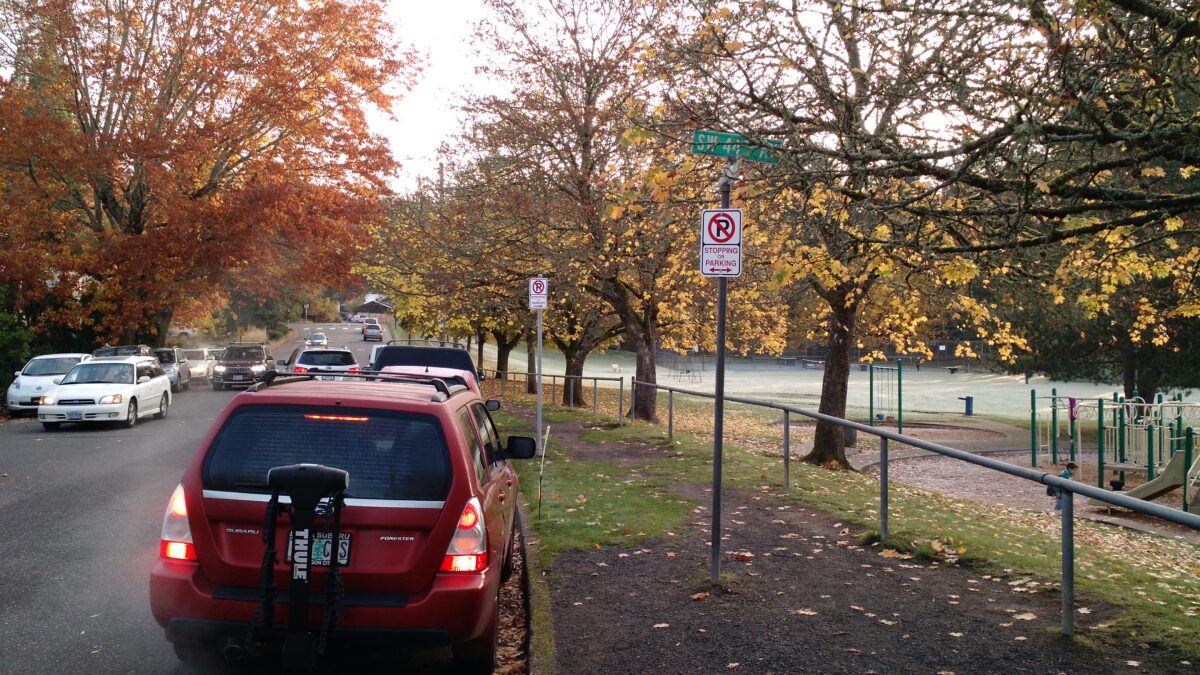
Car stopped at no parking sign in front of Bridlemile Elementary School in southwest Portland.
(Photos: David Stein)
Publisher’s note: This post is by southwest Portland resident David Stein. He shares the story behind a local project he worked on as part of the much-heralded PSU Traffic & Transportation Class. It’s a great example of how to identify and tackle a nagging street safety problem and we hope it’s an inspiration to some of you. Stein is also a member of the PBOT Bicycle Advisory Committee.
As a student project in the Portland State University Traffic and Transportation course, I decided to try improving a safe route to Bridlemile Elementary in southwest. In the class we’re told, “You have a PhD in your neighborhood,” and the leaders encourage us to make Portland a better place through a class project.
My PhD is in the Bridlemile neighborhood. I’ve lived there for over six years and have been active in the Bridlemile Neighborhood Association (including over three years on the Board of Directors and two as chair). For my project, I chose to improve SW 47th Drive, because my daughter goes to Bridlemile Elementary School. With only one road for entering and exiting the school, and Hamilton Park next door, traffic on SW 47th Drive can be challenging for everyone. Combining school busses, parents dropping off kids, and kids riding their bikes or walking to school with normal neighborhood and park traffic leads to a daily exercise in controlled chaos. Safety hazards include dangerous U-turns, reduced visibility due to parked cars and an underutilized traffic circle.
Here’s a map I created for my project presentation that lays out all the issues:
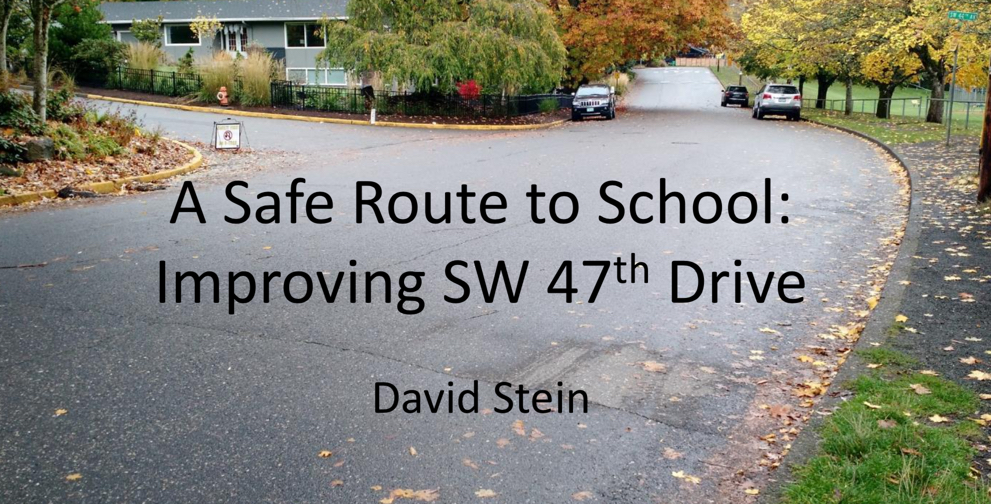
Seeing the chaos first-hand while walking my daughter to school last February as these issues were also being raised in BNA meetings, was eye-opening. There had recently been advocacy work around other projects for Safe Routes to Schools (SRTS) due to funding from the Fixing Our Streets program that was being allocated at the time. Improving SW 47th Drive didn’t make the cut for that funding. However, there was enough community interest to put together a meeting for a variety of stakeholders later that month. So that’s what we did.
A group of residents, the school principal, representatives from the neighborhood association, and Portland Bureau of Transportation (PBOT) Safe Routes staff met on a rainy morning to walk through the issues that were engineered into the roadway. Following this encouraging meeting everything was quiet – updates were sparse.
With the start of the 2018-19 school year it was time to check back into the project and try to see what could be done to get some changes implemented. As luck would have it, the principal was already in contact with several nearby residents on this project and the Traffic and Transportation course would be an ideal conduit to see what could be done.
After that, I went through the course’s iterative process of identifying the project, coming up with solutions (in line with what had officially been requested following the aforementioned walkthrough), and then contacting city officials. The last step was critical as PBOT was working behind the scenes on improvements to the road and had made a request to enable the installation of a marked crosswalk. During this process I was also in touch with the school and neighbors to keep them informed. After notifying the principal of the hang-up with the marked crosswalk, things moved quickly. There was a flurry of activity as details of the changes were announced. After some community input, several ‘No Parking or Stopping’ signs were installed along with a brand new crosswalk. In addition, there were lengthy explanations of some requested changes that weren’t implemented so everyone could understand the degree of consideration that went into this process.
And if you’re curious, I should mention that “No U turn” signs in low-volume residential areas are considered by PBOT to be ineffective, no matter how many times people request them (we requested them several times).
As a result of this project kids are safer going to and from Bridlemile Elementary School and Hamilton Park, on SW 47th Drive. The new crosswalk and marked car free areas improve visibility and make it clear that people on foot are in the area.
After going through this process, here are some key takeaways:
➤ Consistent communication is important for any project, and regular check-ins can help keep the project moving.
➤ Contact information is publicly available online and phone calls can be surprisingly productive. There were no secret handshakes or unlisted phone numbers required to make this project happen.
➤ Having an organized coalition within the neighborhood actually helped PBOT, since they don’t have the staffing or determination to push through a small project like this if there is resistance.
➤ There’s a need for long-term education and outreach for the traffic changes implemented by this project. It will take some time for parents to get used to dropping their kids off a bit further away from the school. Messages have been sent from the school about the changes though compliance is still lagging.
➤ One reason this project was implemented so quickly was the promise of having crossing guards, which are now in place before and after school which also serve to calm traffic.
➤ Finally framing this as a Safe Routes to Schools project definitely helped to get this prioritized within PBOT. BNA has improved communication with PBOT as knowledge of their programs, funding models, and internal priorities has become better known.
It’s been a few months now since these updates were completed. The new crossing is now staffed with a parent or staff member (including the principal at times) to assist kids and parents crossing the street. Compliance with the signage and road markings has improved as people became more aware of the changes (staffing of the crosswalk has helped with drop-off in the morning). It’s still not perfect, though there is a significant improvement in the traffic flow and feeling of safety for kids getting to and from school.
Finally, this project was the result of many people who put in a lot of time before, during, and after the actual project implementation. Without the help of Ryan Bass, Kurt Haapala, Carlos Hernandez, Brad Pearson, Lale Santelices, and many other dedicated people, this project would not have been possible.
[We hope you found David’s experience helpful and inspiring. Below is a PDF of his class presentation.]
PTTC - A Safe Route to School— David Stein
Never miss a story. Sign-up for the daily BP Headlines email.
BikePortland needs your support.
The post Adventures in Activism: How one Portlander made the route to his daughter’s school safer appeared first on BikePortland.org.
from BikePortland.org http://bit.ly/2CTRKLs
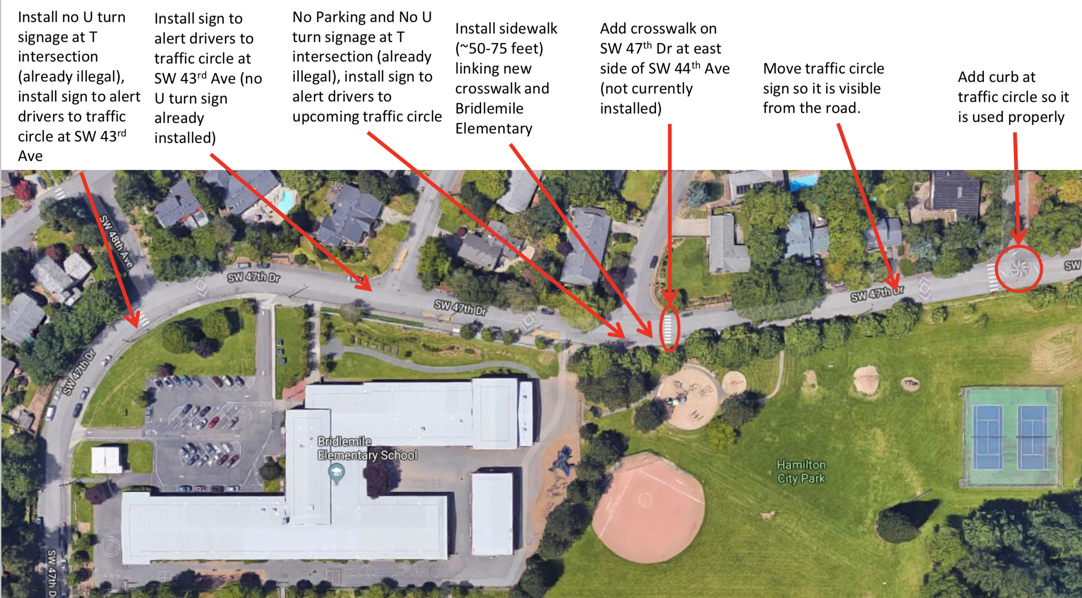

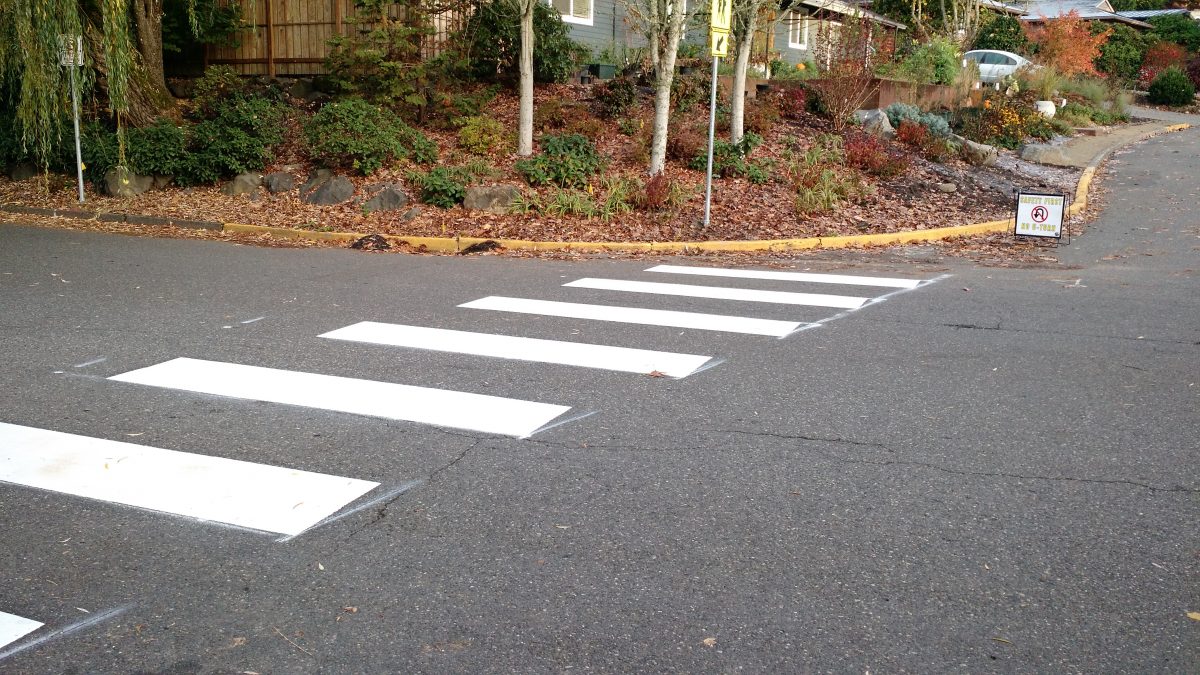
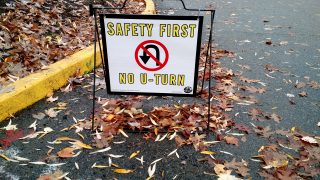
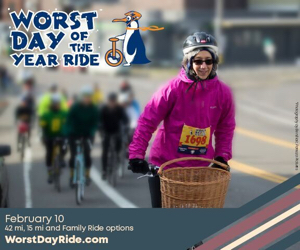
No comments:
Post a Comment